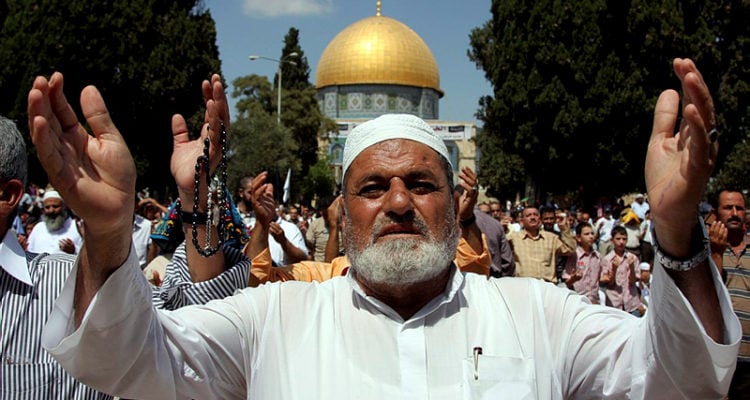The Jordanian government opened the council that runs the Temple Mount to Palestinian Authority members and local Muslim leaders.
By David Isaac, World Israel News
The Jordanian government has expanded the number of members in the Jerusalem Islamic Waqf, which handles day-to-day operations of the Islamic sites on the Temple Mount, Jerusalem’s holiest site, Haaretz reported on Monday.
Jordan made the announcement last week that it was expanding the number of members from 11 to 18 and for the first time will include members of the Palestinian Authority and local religious leaders.
Reasons suggested for Jordan’s decision to expand the council are conflicting. Haaretz reports that “the Jordanian government expanded the number of members in the Waqf in the hopes of thwarting Israeli efforts to change the delicate status quo at the holy site, according to sources at the religious trust.”
However, The Times of Israel reports that Jordan’s influence had eroded after a battle over metal detectors the Israeli government installed at the site following a terror attack that resulted in the killing of two Israeli policemen. Israel eventually bowed to pressure and removed the detectors.
In the wake of that fight, “Palestinian leaders who led the protests saw their influence grow. The Waqf council’s new membership reflects that shift,” The Times of Israel reports.
If the latter is the case, Jordan may have felt compelled to expand the Waqf council out of necessity and not out of a desire to share responsibility for running Islam’s third holiest site.
According to Maj. Gen. (ret.) Gershon Hacohen, the Jordanians see the Temple Mount, or Haram al-Sharif as it’s known to Muslims, as one of their main responsibilities.
Hacohen, who is a senior research fellow at the Begin-Sadat Center for Strategic Studies, says the Temple Mount is the key to understanding the struggle between Jews and Muslims, which boils down to who “is chosen to get the Promised Land. Very simple. Everything is religious.”
The initial actions of the expanded Waqf suggest it will lead to rising tensions. The council met for the first time last Thursday in an area closed by Israeli police, after which it entered the area to pray. On Monday, the Waqf summoned worshipers to the same spot, leading to a clash with police in which five Palestinians were arrested.
Although Israel had conquered the Temple Mount in 1967, it handed control of the area to Jordan, a decision made by then-Minister of Defense Moshe Dayan.
Palestinian leaders have repeatedly used the fictitious threat of a Jewish takeover of the site as a rallying cry to whip up violence against Jews, a tactic started even before the Jewish state was established. Terrorists today frequently attribute their attacks, whether by car-ramming, knifing or shooting, to their desire to defend the Temple Mount against Jews.
In recent years, Jews have been going up to the Temple Mount in rapidly rising numbers, signifying a dramatic shift in thinking as rabbis once considered the site too holy to enter. Now, the entire spectrum of religious Zionists views visiting the Temple Mount as permissible. However, Israeli authorities prohibit Jews from praying there to avoid offending Arab sensibilities.




